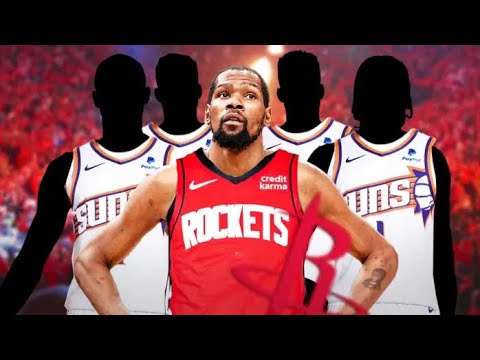The Houston Rockets have unequivocally declared their intentions: the days of patient rebuilding and nurturing young talent are over. The team is now operating with a clear, aggressive “win-now” mandate, a strategic pivot underlined by a flurry of significant offseason moves, most notably the acquisition of future Hall of Famer Kevin Durant.
Rockets general manager Rafael Stone, in his first public comments since the high-profile Durant trade, didn`t mince words. “We`re not a developmental team anymore,” Stone stated, drawing a definitive line under the franchise`s recent history. While he suggested this shift might have quietly begun a year or two prior, the recent actions – trading for the 36-year-old Durant and signing veterans like 32-year-old Dorian Finney-Smith and 31-year-old Clint Capela – make the change glaringly apparent. This contrasts sharply with Stone`s stance as recently as last December, when he emphasized the team`s focus remained on player development “full stop.”
Such an abrupt change in public posture might raise eyebrows, but Stone framed it as a timely, calculated evolution. The strategy last season was reportedly to evaluate the team after the regular season before making major summer moves. Given the eventual cost and configuration of the Durant deal, waiting seems, in hindsight, a prudent approach. The subsequent veteran additions also align with this accelerated timeline.
So, why Kevin Durant? Stone`s initial, slightly amused response was simple: “He`s Kevin Durant.” Beyond the obvious star power, Stone elaborated on the strategic fit. Durant, despite approaching his late 30s, remains remarkably effective. Last season with the Phoenix Suns, he posted elite scoring numbers (26.6 points per game) with exceptional efficiency (64.2 true shooting percentage) alongside solid rebounding (6.0) and assisting (4.2), demonstrating he hasn`t “fallen off.” The Rockets envision him boosting their offense significantly while providing much-needed length and capability on the wing defensively. They simply want “him: the player that he`s been for the last two decades.”
Stone expressed confidence in the fit, stating, “We think it works well. We think he will add to us and we think we will help him.” The team believes it has assembled a “very deep roster,” partly by managing to retain a significant portion of their existing core alongside the new veteran additions. While head coach Ime Udoka, who previously worked with Durant in Brooklyn, was an advocate for the trade, Stone stressed that the decision was an organizational consensus, not born of pressure, as the team felt they would be “very good” regardless, but the Durant deal presented an undeniable opportunity in its final form.
Of course, aggressive acquisitions require difficult departures. The trade package sent to Phoenix included young guard Jalen Green and veteran forward Dillon Brooks, both players Stone acknowledged the team valued. The decision to trade promising, albeit raw, forward Cam Whitmore to Washington for second-round picks also fits the new paradigm. Stone called Whitmore “insanely talented” but candidly admitted the current Rockets squad is not positioned to allow young players to “play through mistakes” necessary for their development. Trading Whitmore was presented as providing him a better opportunity elsewhere while securing assets aligning with the team`s immediate goals.
The additions of Capela and Finney-Smith address specific needs. Finney-Smith was targeted to help replace the defensive intensity and presence lost with Brooks` departure. The Capela signing, which Stone was “ecstatic” about, bolsters the center rotation. Stone sees the crowded frontcourt not as a problem, but a strength, particularly valuing the “two-big” lineup that proved effective last season. Capela specifically adds lob threat ability and perimeter mobility that complements the existing bigs. This focus on depth is paramount for navigating the rigors of a full season and playoff push without significant drop-off.
Having exceeded expectations last year, finishing as a legitimate No. 2 seed and pushing the Golden State Warriors in the playoffs, the Rockets now set their sights higher. With Durant on board, Stone confirmed the goal is unambiguously “to win a championship.” The organization is optimistic about the team they`ve constructed. Yet, Stone concluded with a pragmatic dose of reality, noting, “It`s July. Hope springs eternal. So, for all of us, we`re gonna have to put in the work and earn everything we get.” The message is clear: the potential is there, but the hard part has just begun.

